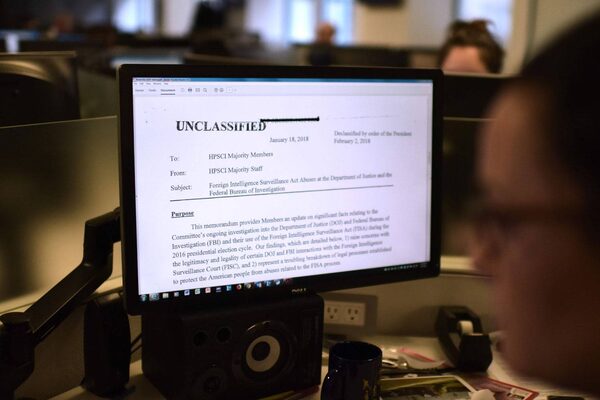
In Washington, D.C., a journalist’s computer screen shows the Republican memo released by Congress on Feb. 2, 2018.ERIC BARADAT/AFP / Getty Images
U.S. President Donald Trump authorized the release of a secret Republican memo that alleges misconduct by law-enforcement officials in the probe into Russian interference in the past presidential election, escalating his campaign to discredit the investigation as a politically motivated "witch hunt."
Mr. Trump also redoubled his attacks on the Federal Bureau of Investigation and the Department of Justice, saying that senior officials and investigators had "politicized the sacred investigative process in favour of Democrats and against Republicans."
The 3 1/2-page memo, which is the subject of a political furor, focuses on requests by FBI and Justice Department officials to conduct surveillance on Carter Page, a former Trump campaign adviser. Mr. Page is an American citizen who travelled to Moscow in the summer of 2016 and met with at least one Russian government official.
The memo's main allegation is that prosecutors improperly relied on a dossier prepared by Christopher Steele, an ex-British spy, to justify their requests to put Mr. Page under surveillance.
According to the memo, the surveillance applications did not mention that Mr. Steele was indirectly paid for his work by the campaign of Mr. Trump's opponent, Hillary Clinton. They also did not include Mr. Steele's views of Mr. Trump, which were that he should not be elected president, the memo says.
The freshly declassified memo does not say any laws were broken by the conduct it describes. It also confirms that the Russia investigation was already under way months before the events it criticizes. The investigation began in July, 2016, based on intelligence unconnected to the Steele dossier, the memo indicates.
Mr. Trump told reporters in the Oval Office that the revelations in the memo were "terrible" and a "disgrace." He continued: "A lot of people should be ashamed and much worse than that."
The release of the document will do little to end the furious fight over its contents, which has pitted Democrats – and a few Republicans – against Mr. Trump and his allies. Mr. Trump's decision to reveal the memo has also opened a striking rift between the President and the law-enforcement agencies he ultimately oversees.
The House Intelligence Committee released the document Friday after getting Mr. Trump's sign-off. Mr. Trump moved ahead despite repeated objections by officials from the FBI, Justice Department and intelligence community, who told him that the memo was misleading and could potentially damage U.S. interests. Republican lawmakers also blocked the public release of a rebuttal prepared by Democrats, which reportedly undercuts the memo's key assertions.
Mark Warner, the ranking Democratic member on the Senate Intelligence Committee, directly contested the memo's findings on Friday. "Unlike almost every House member who voted in favour of this memo's release, I have read the underlying documents on which the memo is based," said Mr. Warner in a statement. "They simply do not support its conclusions."
Trey Gowdy, a Republican who serves on the House Intelligence Committee and also reviewed the underlying documents, said the memo raised "serious concerns" with the process of granting surveillance warrants. But he said he remained "100-per-cent confident" in special counsel Robert Mueller, who is conducting the Russia probe, and that the memo does not discredit his investigation.
Mr. Trump, however, appears to disagree. The President told aides and confidants that the memo would bolster his claim that the Russia investigation was a "witch hunt," according to the Washington Post, and suggested it might provide a reason to fire Rod Rosenstein, the number-two official at the Justice Department who supervises Mr. Mueller's probe.
In the wake of the memo's release, top congressional Democrats sent a letter to Mr. Trump warning the President not to use the document as a "pretext" to fire Mr. Rosenstein. Such an "unwarranted action" would amount to an "attempt to obstruct justice in the Russia investigation," they wrote.
The fear is that Mr. Trump – who has already fired one FBI director over the Russia probe – might be willing to go even further. "We are two tweets away from a full-blown constitutional crisis," said Tim Weiner, an author who has written books on the history of the FBI and the Nixon administration.
On Friday, John McCain, a Republican senator from Arizona, also pushed back against Mr. Trump's vocal criticism of the probe.
Mr. Trump and other elected officials "must stop looking at this investigation through the warped lens of politics," he said in a statement. "The latest attacks on the FBI and Department of Justice serve no American interests – no party's, no president's, only Putin's."
For weeks, Republican commentators and lawmakers have described the memo as a bombshell whose contents would shock the public. Some even asserted that its revelations were worse than the Watergate scandal. By that standard, the memo fell flat.
"That's it?" wrote former FBI director James Comey on Twitter (Mr. Trump fired Mr. Comey last year). "Dishonest and misleading memo wrecked the House intel committee, destroyed trust with Intelligence Community … and inexcusably exposed classified investigation of an American citizen. For what?"